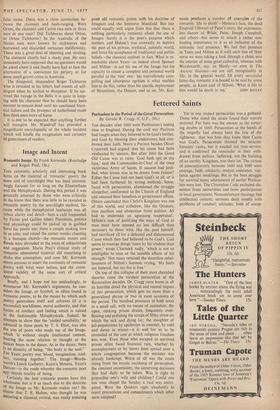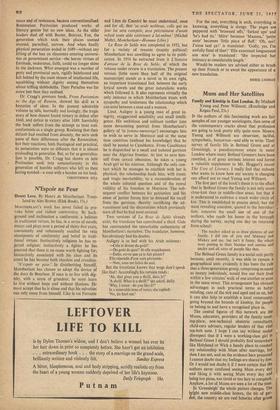Fettered Saints
THE decades after 1660 were Puritanism's testing time in England. During the civil war Puritans had fought what they believed to be God's battles; and God by blessing their endeavours had con- firmed their faith. Many a Puritan besides Oliver Cromwell had argued that his cause had been vindicated by success. But after 1660 the Good Old Cause was in ruins. 'God bath spit in my face,' said the Commander-in-Chief of the once victorious Army of Saints. If success had justi- fied, what lesson was to be drawn from failure? Either the Cause had not been God's at all, or it had been furthered by wrong methods. Some, faced with persecution, abandoned the struggle altogether, conformed to the Church of England and retained their benefices or government offices. Others concluded that Christ's Kingdom was not of this world, and withdrew, like the Quakers, into pacifism and abstention from politics. All had to undertake an agonising reappraisal : Milton's task of justifying the ways of God to man must have seemed no less difficult than necessary to those who, like the poet himself. had sacrificed all for a defeated and dishonoured Cause which they had believed to be God's. God seems to manage things 'more by his wisdom than power,' wrote Charnock sadly, 'which is not so intelligible to man as the sensible effects of his strength.' Not many retained the dauntless rebel- liousness of Milton's Samson, crying, 'My heels are fettered, but my fist is free.'
On top of this collapse of their most cherished theories came the virulent persecution of the Restoration decades. Dr. Cragg rams home in all its horrible detail the physical and mental impact of this persecution, which gets no more than a generalised phrase or two in most accounts of the period. The hundred prisoners of both sexes in a small cell, with no means of sanitation; the open, stinking prison drains, frequently over- flowing and polluting the scraps of filthy straw on which the sick and dying lay; the slaughter of jail-populations by epidemics in summer, by cold and damp in winter—it is well for us ' to be reminded of the cost at which religious freedom was won. Even those who escaped or survived prison often faced financial ruin, whether by unemployment or by heavy fines spread over a whole congregation because the minister was already bankrupt. Worst of all was the strain rising from the erratic incidence of persecution. the constant uncertainty, the unnerving dedisions that had daily to be taken. Was it right to jeopardise one's wife and children? Could one not miss chapel the Sunday a raid was antici- pated. Were the Quakers right absolutely to reject precautions and concealments which other sects adopted? Yet in one respect persecution was a godsend. Thase who stood the strain found their morale restored. For here was the answer to the tortur- ing doubts of 1660. Persecution at the hands of the ungodly had always been the fate of the righteous : that was how they knew their Cause was God's. Persecution thinned the noncon- formists' ranks,, but it weeded out time-servers, and it confirmed the remainder in their with- drawal from politics. Suffering, not the building of an earthly Kingdom, was their lot. The virtues of nonconformity between 1660 and 1689 were courage, faith, solidarity, mutual assistance, vigi- lance against weaklings. But in the bare struggle for survival many adornments of earlier Puritan- ism were lost. The Clarendon Code excluded dis- senters from universities and from participation in local government. Nonconformist theology lost intellectual content; sermons dealt mostly with problems of conduct; attitudes, both of accep- tance and of resistance, became conventionalised. Restoration Puritanism produced works of literary genius but no new ideas. As the older leaders died off with Baxter, Bunyan, Fox, the generation which took their places seemed stunted, parochial, narrow. And when finally physical persecution ended in 1689—without any lifting of the ban on dissenters entering universi- ties or government service—the heroic virtues of fortitude, endurance, faith, could no longer shine in the darkness. What emerged was a number of petty and provincial sects, rigidly hidebound and left behind by the main stream of intellectual life, squabbling without dignity among themselves about trifling shibboleths. Their Paradise was far more lost than they realised.
Dr. Cragg's previous book, From Puritanism .to the Age of Reason, showed his skill as a historian of ideas. In the present admirable volume he tells, learnedly and lovingly, the tragic story of how dissent found victory in defeat after 1660, and defeat in victory after 1689. Inevitably the book suffers from the attempt to treat non- conformists as a single group. Realising that their default had resulted from disunity, the sects sank some of their differences after the Restoration; but their reactions, both theological and practical, to persecution were so different that it is almost misleading to generalise. But, so far as generalisa- tion is possible, Dr. Cragg has shown us how Puritanism sank into nonconformity in this generation of humble sufferers who left us their fasting symbol—a man with a burden on his back.
CHRISTOPHER HILL



































 Previous page
Previous page